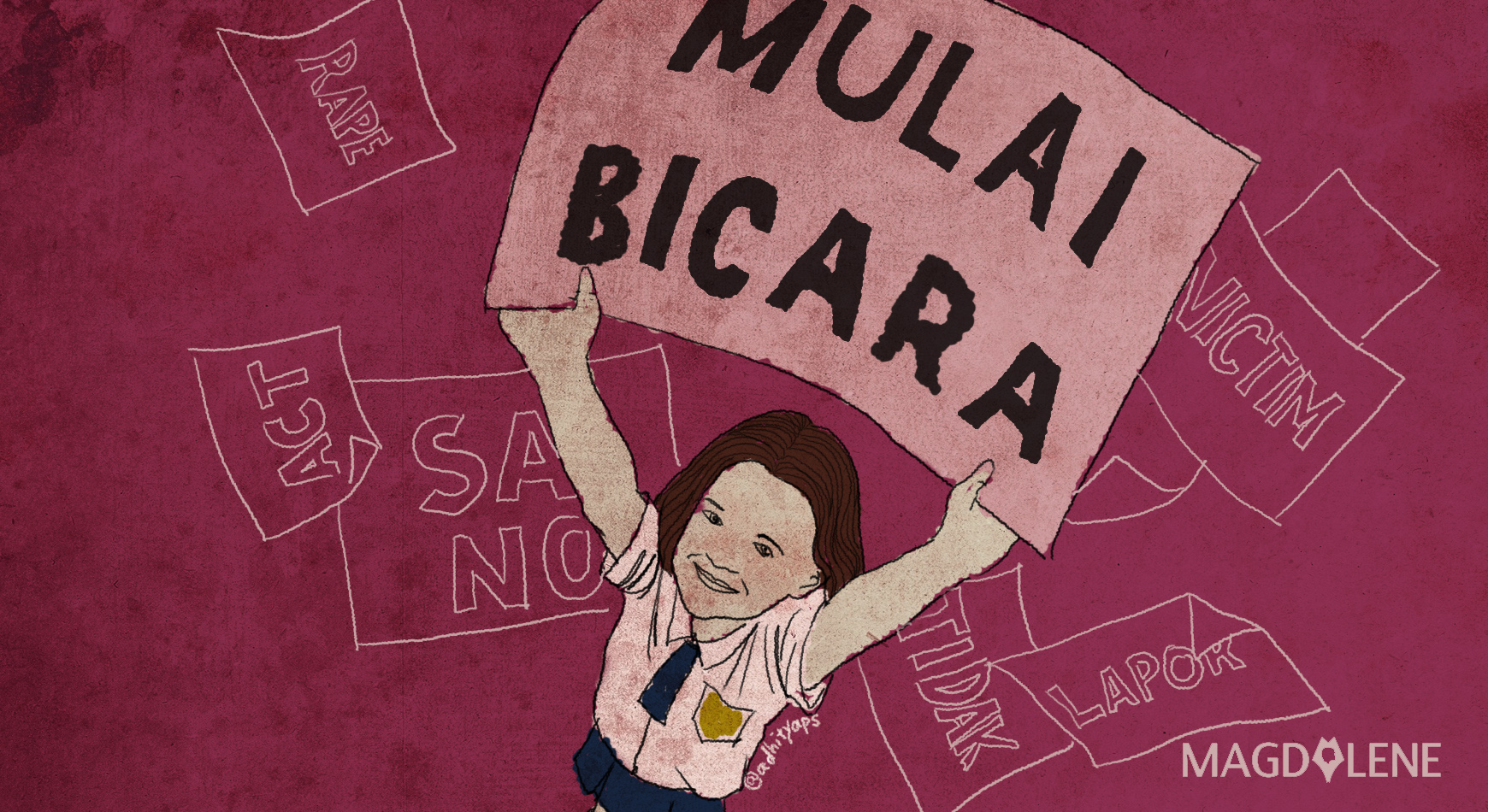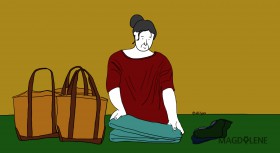I was in elementary school the first time a boy in my class pulled the string of my bra and peeked into my skirt. There was that time also when some boys pulled their penises out of their pants to scare off girls. Some of my male elementary school teachers liked to grabbed my waist and sit me in their lap whenever I came to them and asked questions about assignments during class.
It didn’t feel inappropriate. It made me feel uncomfortable, but I thought the boys were just trying to be funny and the teachers were being affectionate.
Only once did I feel really threatened: back in sixth grade, riding a public minivan one afternoon, a man touched my calf and grinned when I looked at him. I said “STOP!” to the driver immediately and ran home. I’ve never told my parents about that – it’s not a subject that we can normally and casually talk about.
Those are the things I recalled from my childhood when I met Sophia Hage, co-founder and campaign manager of Lentera Sintas Indonesia to talk about #MulaiBicara or #TalkABoutIt latest campaign on educating high school students about sexual violence.
“Children and teenagers have gotten used to trivialize body violation. They need to know that sexual abuse is started by those things that they consider “grey area” or “normal” just because it was done by somebody they know or trust,” said Sophia.
In fact, she said, two-third of sexual abuse perpetrators are not strangers, but people we trust.
The first batch of the campaign was conducted a few months ago (July 18th – July 22nd) at 77 high schools in Jakarta area, including junior high schools, senior high schools and vocational high schools. Involving 146 young volunteers, the talk was held at the respective schools during their new student orientation week, reaching about 15,000 students in total.
Lentera Sintas Indonesia Chief Director Wulan Danoekoesoemo said that the organization’s main aims are to educate the young generation about sexual violence issue, to introduce the concept of consent, and to promote healthy relationships.
“We hope they can learn to respect their opposite sex,” Wulan said.
Main Concern
The absence of gender and sexuality lesson in school’s curriculum has resulted in very poor knowledge of sexuality among teenagers, Sophia said.
“It’s ridiculous and kind of sad to hear that our young volunteers got the exact same kind of sexual education at school as my generation: the ‘scare tactics’ in biology class with those nasty pictures of sexual diseases, so people won’t have sex,” she said.
A month-long #MulaiBicara online survey conducted by Lentera, Magdalene and facilitated by Change.org Indonesia found that two-third of sexual abuse incident happened to those below 18 years old. This is why the teenage group become the first priority.
One of the volunteers, Astri, 17, who is a student of Atmajaya University, echoed a similar concern: “I myself am a survivor of sexual violence. I never got a proper sexual education, so back then when it happened, it was difficult for me to identify the situation. I don’t want what happened to me happens to anybody else.”
Teenagers need a proper source on sexual education to navigate a highly globalized and digitally connected world, she said.
“It’s time to admit that the scaring approach doesn’t work. Curious kids can look up whatever information they need on the internet, and without proper basic understanding from trusted sources, they would have no way of knowing how to filter the information,” she said.

Another volunteer, Thalia, a graduate from English Studies at University of Indonesia said sexual violence is an issue that is largely overlooked by society.
“I just started to become aware of sexual abuse problems when I got to college. As the older generation does not seem to understand the urgency of the issue, schools should be the place where the youth can gain knowledge about it,” she said.
Reception
Responses to the awareness campaign at schools have been positive so far, Sophia said.
“We even heard from one of the teachers that, after the session, one student came to them and report that she had experienced sexual abuse,” told Sophia.
Some schools have requested teacher’s training on the issue, especially for school’s counselors, so that they can pass the knowledge to parents as well, she said.
There were touching moments, Sophia said, like when reading students’ writing words of encouragement in their feedbacks: “Let’s be brave to say NO”, or “Don’t let those people enter your personal space”, or even “Don’t teach women how to dress, teach men not to rape.”
However, they realize that the fight is still a long and arduous one.
“One teacher said to one of our volunteers: ‘You are campaigning anti-rape, but why are you dressed like you’re inviting rape?’” she recalled the incident told by the volunteer.
“The thing is she was wearing a shirt and trousers – not tank top, not a short skirt, not even jeans,” she said, adding that it was very inappropriate for a teacher to say that a type of women clothing can “invite rape.”
Some responses are alarmingly misogynistic, however. Like a student’s note that says “If you don’t want to get raped, don’t play hard to get”, and another one also with the same handwriting says “Please leave some virgins for us”.
“We realized that the session may not be fully effective because it took place during the freshmen orientation period, which means 300 to 500 new students sitting in a big room listening to two to three volunteers. That is why we are going to keep reaching out to them and keep the campaign going,” explained Sophia.
The next batch of #TalkAboutIt campaign will start this September at 25 high schools for the second grade and third grade students.
“In the near future, we also have a plan to do similar thing for students at university level. We are going to hold movie screening and discussions but on deeper topics of sexual abuse issues,” said Sophia.
Read Ayunda’s piece on how the media must help fight stigma and discrimination against LGBT people.









Comments